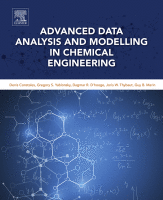Browse content
Table of contents
Actions for selected chapters
- Full text access
- Book chapterAbstract only
Chapter 1 - Introduction
Pages 1-8 - Book chapterAbstract only
Chapter 2 - Chemical Composition and Structure: Linear Algebra
Pages 9-34 - Book chapterAbstract only
Chapter 3 - Complex Reactions: Kinetics and Mechanisms – Ordinary Differential Equations – Graph Theory
Pages 35-82 - Book chapterAbstract only
Chapter 4 - Physicochemical Principles of Simplification of Complex Models
Pages 83-103 - Book chapterAbstract only
Chapter 5 - Physicochemical Devices and Reactors
Pages 105-157 - Book chapterAbstract only
Chapter 6 - Thermodynamics
Pages 159-220 - Book chapterAbstract only
Chapter 7 - Stability of Chemical Reaction Systems
Pages 221-265 - Book chapterAbstract only
Chapter 8 - Optimization of Multizone Configurations
Pages 267-284 - Book chapterAbstract only
Chapter 9 - Experimental Data Analysis: Data Processing and Regression
Pages 285-306 - Book chapterAbstract only
Chapter 10 - Polymers: Design and Production
Pages 307-349 - Book chapterAbstract only
Chapter 11 - Advanced Theoretical Analysis in Chemical Engineering: Computer Algebra and Symbolic Calculations
Pages 351-393 - Book chapterNo access
Index
Pages 395-399
About the book
Description
Advanced Data Analysis and Modeling in Chemical Engineering provides the mathematical foundations of different areas of chemical engineering and describes typical applications. The book presents the key areas of chemical engineering, their mathematical foundations, and corresponding modeling techniques.
Modern industrial production is based on solid scientific methods, many of which are part of chemical engineering. To produce new substances or materials, engineers must devise special reactors and procedures, while also observing stringent safety requirements and striving to optimize the efficiency jointly in economic and ecological terms. In chemical engineering, mathematical methods are considered to be driving forces of many innovations in material design and process development.
Advanced Data Analysis and Modeling in Chemical Engineering provides the mathematical foundations of different areas of chemical engineering and describes typical applications. The book presents the key areas of chemical engineering, their mathematical foundations, and corresponding modeling techniques.
Modern industrial production is based on solid scientific methods, many of which are part of chemical engineering. To produce new substances or materials, engineers must devise special reactors and procedures, while also observing stringent safety requirements and striving to optimize the efficiency jointly in economic and ecological terms. In chemical engineering, mathematical methods are considered to be driving forces of many innovations in material design and process development.
Key Features
- Presents the main mathematical problems and models of chemical engineering and provides the reader with contemporary methods and tools to solve them
- Summarizes in a clear and straightforward way, the contemporary trends in the interaction between mathematics and chemical engineering vital to chemical engineers in their daily work
- Includes classical analytical methods, computational methods, and methods of symbolic computation
- Covers the latest cutting edge computational methods, like symbolic computational methods
- Presents the main mathematical problems and models of chemical engineering and provides the reader with contemporary methods and tools to solve them
- Summarizes in a clear and straightforward way, the contemporary trends in the interaction between mathematics and chemical engineering vital to chemical engineers in their daily work
- Includes classical analytical methods, computational methods, and methods of symbolic computation
- Covers the latest cutting edge computational methods, like symbolic computational methods
Details
ISBN
978-0-444-59485-3
Language
English
Published
2017
Copyright
Copyright © 2017 Elsevier B.V. All rights reserved.
Imprint
Elsevier
